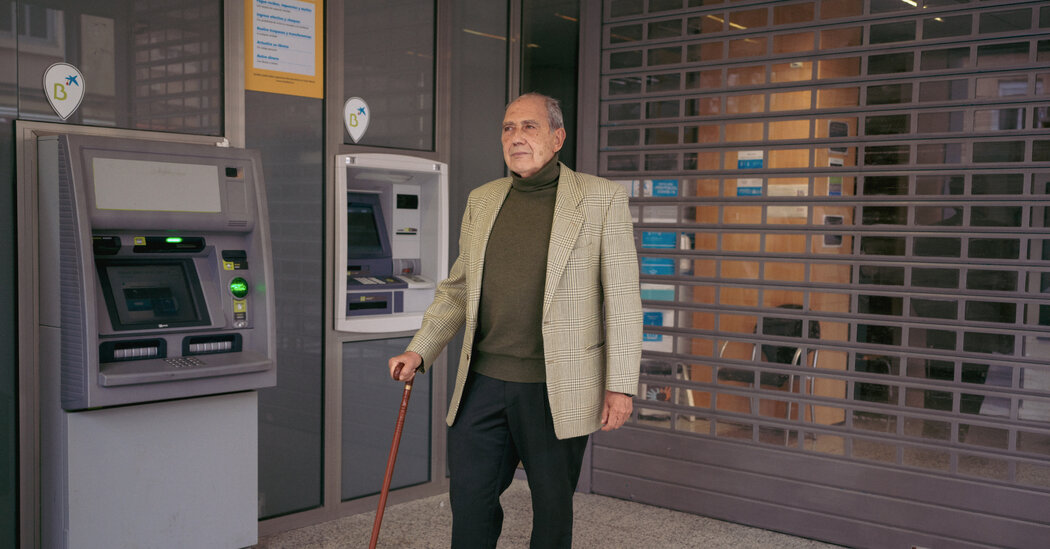
MADRID — Because he has Parkinson’s disease, and his shaking hands make it hard for him to push buttons, Carlos San Juan de Laorden, a retired Spanish doctor, finds it difficult to withdraw his money from the ATM.
So when in December his bank reduced its retail opening hours, and then told him that the only way of reaching a customer representative was by making an appointment using an app he found too complicated, Mr. San Juan, 78, felt not only distressed but also wronged.
“I was politely told that I could change banks if I didn’t like it,” he said. “I’ve kept my money in the same bank for 51 years, since I got my first paycheck, and it hurts to see that the digital world has dehumanized us to the point that loyalty has lost all of its worth.”
Infuriated, Mr. San Juan started an online petition that he called “I’m Old, Not an Idiot,” arguing that banks and other institutions should serve all citizens, rather than sideline the oldest and most vulnerable members of society in their rush to online services.
In two months, his petition gathered more than 600,000 signatures, attracting the attention of the local media and eventually forcing the banks and Spain’s government to respond. Mr. San Juan became something of a minor celebrity in Spain, and was invited on to a string of TV shows to talk about himself and his campaign.
In February, Mr. San Juan attended the signing of a protocol at the economic ministry in Madrid in which banks pledged to offer better customer services to senior citizens, including by extending again their branch opening hours, giving priority to older people to access counters and also simplifying the interface of their apps and web pages.
During the signing ceremony, José María Roldán, the president of the Spanish Bank Association, thanked Mr. San Juan for highlighting a problem that he said banks had overlooked. “We have seen that new measures are needed in order to not leave behind vulnerable groups” of people, said Mr. Roldán, whose association includes banking giants like Banco Santander and BBVA.
Spain has one of the world’s fastest aging populations, with 9.3 million people over the age of 65 who now account for one fifth of its residents. Before the pandemic hit, Spain was projected to overtake Japan as the country with the longest life expectancy in the world, according to a study by the Institute for Health Metrics and Evaluation, in Seattle.
But over the past decade, Spain’s banking network has also shrunk dramatically, following a financial crisis that forced the country to negotiate an international bailout in 2012. While there used to be a bank office in almost every Spanish village and at every city crossroads, Spanish banks have halved their number of branches to about 20,000 since the crisis.
Mr. San Juan is not a Luddite — for this article, he used WhatsApp and Skype. But he believes older adults should not pay the price for an online transition that has allowed banks and other institutions to make significant staff cuts and other savings.
In fact, Mr. San Juan said it was ironic that few of the senior citizens whom his petition sought to defend appeared to have been among its signatories, possibly because they were not online. Still, he said, “many younger people feel sympathy for us, starting with my own granddaughters who have been very worried about my health and many others who now have an older family member who cannot cope with apps, and in some cases somebody who cannot afford a smartphone.”
Mr. San Juan was forced into early retirement 13 years ago, when he was diagnosed with Parkinson’s and the shaking made it very hard for him to carry out his hospital work as a urologist in his home city of Valencia, in eastern Spain. Mr. San Juan has since spent his time listening to jazz and reading history books and spy novels — until he became an unlikely activist.
While acknowledging that the digital transition was unstoppable, Mr. San Juan said the authorities and major institutions had a duty to make the change “less abrupt” for older and vulnerable people. Almost every public organization or private corporation is now forcing people to communicate online, including in the health care sector, where Mr. San Juan worked his entire life.
Were it not for Parkinson’s, Mr. San Juan said he would have wanted to work more years, although he looks with some skepticism at changes in the profession that require more remote consultations with patients.
“For me, medicine is a human treatment, which requires looking a patient in the eyes, talking and perhaps consoling if that is what’s required.”
Mr. San Juan also noted that a model of Spanish society in which different generations used to live under the same roof, and help each other, was changing fast, putting more pressure on old people. When he was younger, Mr. San Juan lived for a while with his only grandmother. And after his mother-in-law was widowed, she spent her last 15 years living with him and his wife.
He added that he had long been attuned to the challenges faced by the elderly as a result of his medical specialty.
“Because I’m a urologist, most of my patients have been older people, so I’ve always had a clear understanding of the sense of helplessness and the suffering that can come with age,” he said.
As for the banks, Mr. San Juan said that his disappointment was fueled by the fact that the institutions did not hesitate to ask for billions in taxpayers’ money to rescue them during the financial crisis a decade ago. But when Covid-19 started to spread, he said, the same banks used the pandemic as an excuse to close more branches. Over 3,000 branches shuttered in Spain between the second quarter of 2020 and the third quarter of 2021, according to data from the Bank of Spain.
“The coronavirus has been a perfect excuse for banks and others to force people to stay away and act like robots, while also making their clients do the work that bank employees used to do,” he said.
Some banks took measures to offset their reduced footprint. In 2020, Banco Santander signed an agreement with the Spanish mail service to allow its clients to withdraw cash at post offices in about 1,500 municipalities where the bank doesn’t have a branch. But with millions of retirees forced to withdraw their pension payments from banks, Mr. San Juan believes the institutions still have a long way to go in terms of caring for those whose savings they rely on, rather than prioritizing their shareholders.
“The banks need to keep our pension money, but that should either oblige them to really act as a public service, or force the government to offer us a different way to get hold of the money that is ours,” he said. “You cannot expect old people to queue for hours in the baking sun or in the rain in order to get their life savings.”




